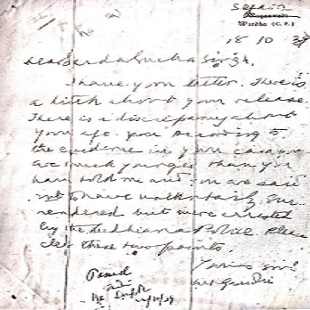Ghadarite Sucha Singh was born in the village of Chohla Sahib in the district of Amritsar in 1880. His father’s name was Gurdit Singh and his mother’s name was Inder Kaur. His was a well-heeled family. He joined the British Indian Army's 23rd Cavalry. This prestigious cavalry unit was attached to the governor of Punjab. Sucha Singh returned home after serving fifteen years in the army. When World War I broke out, he was called back by his unit. During this time, the Ghadar Party's propaganda had reached the general public. Ghadar Party or Hindustan Association of Pacific Coast was established in April 1913 in the United States of America by Sohan Singh Bhakna and other immigrants with the avowed aim of liberating India from the clutches of British rule. Sucha Singh came into contact with some Ghadar Party members and became aware of the exploitative character of British imperialism. After reading Ghadr - the mouthpiece of the Ghadar Party, he understood the distinction between the terms British subject and Indian citizen. The treatment meted out to the passengers of the Komagata Maru ship also had an impact on his mind. Meanwhile, with the outbreak of World War I, Sucha Singh was called back to duty in August 1914. For a few days, he returned home in October. Here, he was contacted by Ghadar Party members. The Ghadar Party's plan to launch an uprising in army units was discussed with him. Sucha Singh agreed to the Party's planning and discussed the whole scheme with his colleagues. Dafedar Lachman Singh, Maharaj Singh, Inder Singh, Surain Singh, Abdullah Nahalband, Budh Singh, Buta Singh, Nihal Singh, Kesar Singh, Wadhawa Singh, Nand Singh, Tara Singh, and others readily agreed to join the uprising. These persons met on a regular basis in the unit's graveyard. Prem Singh of Sur Singh village, a Ghadar Party member, met with these army men in Dafedar Lachman Singh's quarters and briefed them on the Party's plans. Later on, in Jhar Sahib Gurdwara, near Amritsar, - a secret center of the ghadarites - Sucha Singh assured Prem Singh about their participation in the rebellion and handed over a sword as a symbol of commitment. Bogh Singh, a priest of Jhar Sahib Gurdwara, sympathized with the Ghadar Party revolutionaries. The Ghadar Party's network in Punjab was a loose one. The party failed to specify a start date for the rebellion. Several dates in the second fortnight of November 1914 were given, but nothing happened on those dates. Sucha Singh, Chanan Singh, Maharaj Singh, and Surain Singh, became impatient. Ignoring their colleagues' advice, they left the battalion on the intervening night of November 27 and arrived in Jhar Sahib. But fate had other plans. There was no rebellion, and the British officers kept a close eye on the 23rd Cavalrymen. The police were on high . The Jhar Sahib Gurdwara was surrounded by police and military personnel. Sucha Singh, Maharaj Singh, Surain Singh, and Nihal Singh were arrested. All of them faced court martial and were given five years of rigorous imprisonment. Later on, they were implicated in the Supplementary Lahore Conspiracy Case. The trial began on 25 October 1915 and ended on 30 March 1916. Sucha Singh was sentenced to transportation for life and property forfeiture under sections 121 and 131 of the Indian Penal Code for his participation in the revolutionary activities of the Ghadar Party. He was detained at the Hazaribagh Jail in Bihar. He was subjected to harsh treatment by jail officials. In February, 1918, Sucha Singh, Natha Singh Dhun, Hira Singh, Jinder Singh, and fourteen other ghadarites escaped from jail. Some of them were arrested again, but Sucha Singh was able to return home. He became an ascetic and lived incognito in a village in the Malwa region. He decided to surrender to the police in 1937. For this purpose, he contacted Mahatma Gandhi through Prithvi Singh Azad, another important leader. Meanwhile, a police officer betrayed him and claimed to have arrested Sucha Singh after receiving confidential information. He was returned to Hazari Bagh Jail. Here, he was subjected to the brutal treatment of jail officials once more. During this time, he corresponded with Mahatma Gandhi and Prithvi Singh Azad, who both assured him that he would be released. In jail, he was assigned to the B class category. But, he was only released after the country gained independence. He died on November 24, 1953, in his native village. This patriot endured a great deal for the sake of independence.

Mahatma Gandhi’s letter to Sucha Singh in HazariBagh Jail